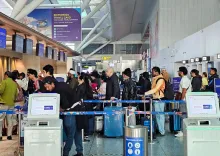Will South Korea Delay Its Decision on Google's Map Data Transfer?

Synopsis
Key Takeaways
- South Korea is likely to delay its decision on Google's map data transfer.
- The upcoming Korea-U.S. summit may impact this decision.
- Concerns over national security and digital sovereignty are paramount.
- Google's previous attempts to obtain similar data were rejected.
- The government is considering security implications of the requested data.
Seoul, Aug 3 (NationPress) The South Korean government is likely to postpone its decision regarding Google's request to export the nation’s high-precision map data overseas, pending the outcome of the forthcoming summit between South Korea and the United States, as reported by officials on Sunday.
In February, the U.S. tech giant submitted a proposal to the state-run National Geographic Information Institute, aiming for approval to transfer 1:5,000-scale high-precision map data to its international data centers, according to Yonhap news agency.
As per existing regulations, the review board must inform Google of its decision within 60 days of the application, with a possibility for a 60-day extension. The South Korean government has opted for the extension, and a decision is anticipated by the new deadline of Aug. 11.
“Despite the timeline, there is a significant chance that the decision deadline will be further pushed back,” an official remarked. “Arriving at a conclusion before the Korea-U.S. summit could affect other topics slated for discussion at the meeting.”
Discussions are ongoing between Seoul and Washington to finalize a date for the summit involving President Lee Jae Myung and U.S. President Donald Trump, who indicated last week that Lee will visit the White House in two weeks.
The suggested map transfer has ignited intense discussions surrounding national security, digital sovereignty, and broader trade issues, with the U.S. highlighting it as a critical non-tariff barrier. However, this issue was not included in the recent tariff talks between both nations.
“Concerns related to security, including the map issue, will be discussed at the upcoming Korea-U.S. summit,” an official from Seoul's presidential office stated.
The decision regarding the Google matter will be made by the map data export review panel, which consists of officials from key ministries, including defense, foreign affairs, industry, and science, alongside the National Intelligence Service.
Currently, Google offers mapping services in South Korea using publicly accessible lower-resolution 1:25,000-scale map data, combined with aerial and satellite imagery, resulting in inferior mapping services compared to local providers.
Google had previously made similar requests in 2007 and 2016, but both were declined due to national security concerns, specifically regarding the potential exposure of military installations and other sensitive areas.
In 2016, the government suggested conditions that required Google to obscure sensitive sites or store the data on domestic servers, which Google rejected.
This time, Google has shown a willingness to comply with the blurring request and has asked for coordinate data for security facilities, raising additional concerns within the government’s security sector.










